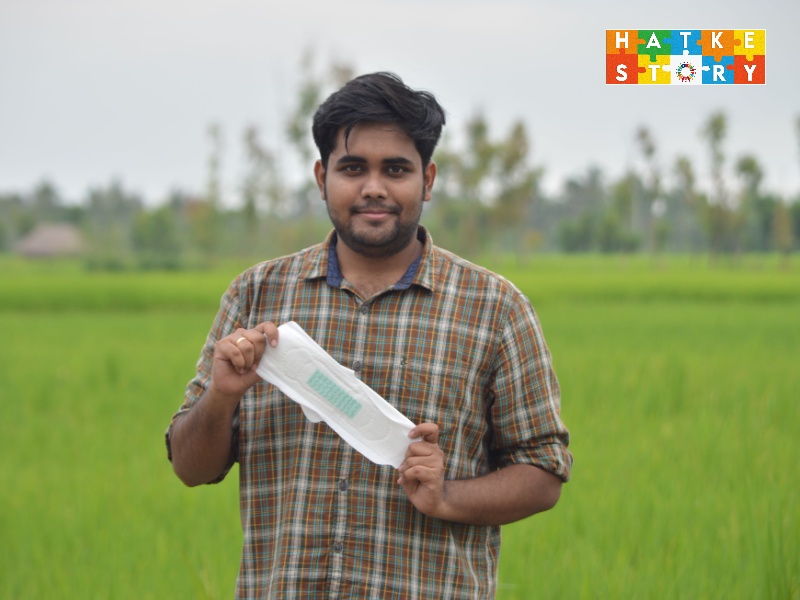For ages, the menstrual cycle has been considered an unclean and filthy thing in our society. In ancient times, women were told to sleep on the ground, away from their room during their periods. They were not allowed to touch anything and were considered dirty. Some of the practices are still alive even in today’s time.
However, it’s a fact that the menstrual cycle is an integral part of a woman’s life, and maintaining menstrual hygiene is necessary to stay disease-free. Without this, something as precious as motherhood would be impossible. Yes, periods are that important, and we all know it. Still, we think in such away. Among all this, today’s guest Sobhan Mukherjee is breaking all the taboos that our society has created.
Many girls shy away from speaking about their periods as if it’s a disease or something that degrades them. They curb the diseases linked to periods and refuse to spend on sanitary pads, essential for maintaining menstrual hygiene. These mistakes shouldn’t happen not at any cost, and it is an elderly woman’s responsibility to guide young girls, but they are themselves unaware.
Whereas, this man Sobhan Mukherjee is spreading awareness regarding menstrual hygiene. The HatkeStory is presenting his views on the subject in this article. Let’s speak to him on the topic and know more about his journey.
Aashna: Hello, Sobhan. We are glad that you got connected to us. Tell us something about yourself.
Sobhan Mukherjee – I am Sobhan Mukherjee, and I belong to Kolkata. My age is 24. I have completed my MSc, and in 2017, I started working for transgender development. Then a simple incident inspired me to work in the area of menstrual hygiene. Currently, I am working with an NGO called CINI (Child In Need Institute), and we are covering rural areas to teach them more about the subject.
Aashna: How did it all start? What inspired you to become a social worker?
Sobhan Mukherjee – Since my childhood, I was always attracted to social working, and my parents stressed more about my moral education. I grew up in a middle-class background and spent my childhood noticing differences between rich and poor. In my school, some students had delicious dishes in their tiffins, whereas some didn’t have tiffins. At that time, I realized that the gap was too huge to omit.
Initially, I was into writing, and I used to write about the transgender community, so I started meeting them to take their story. I used to attend the transgender community programs, and that interested me a lot. During that time, I spoke to Ranjita Sinha (West Bengal Transgender Committee Member) about their education, and she told me that for transgender people, education is challenging. Even if we go to college, then there are no facilities for us. I agreed with her, and that thought led to this.
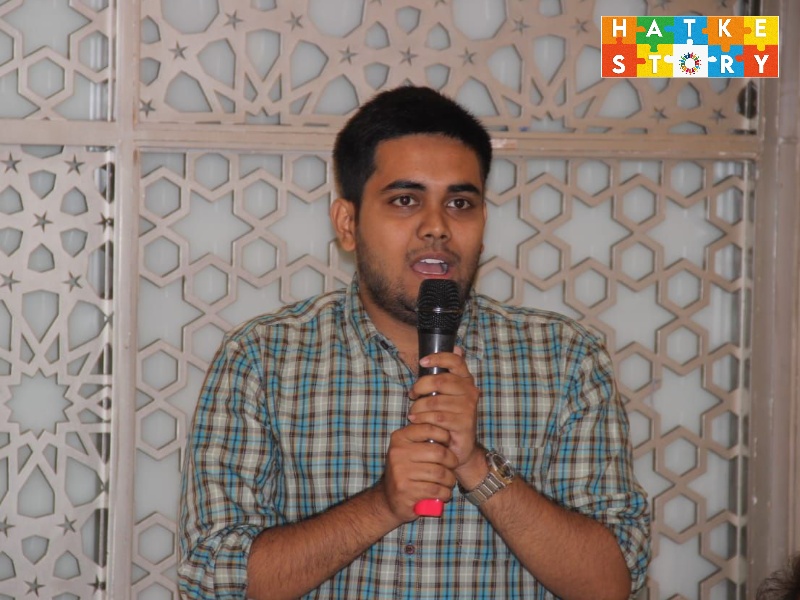
At that time, I realized that the outcome of my writing was meager and uncountable. I need to go on the ground to make it happen. My write-ups for the transgender community are the point from where it all began.
Aashna- When did you start working in the menstrual hygiene area? What led you to it?
Sobhan Mukherjee – After knowing about transgender community problems, I began writing more about it. I had pasted a logo to promote gender equality and to add it to my whole concept. In August 2017, it went viral, and my work was featured in Times of India and various other news blogs and magazines. It became national news, and I got a national award in 2017 as well as in 2018.
Then one day, one of my female colleagues didn’t attend a meeting. I went to check her well beings and to know the reason behind her sudden disappearance. “I’m sick, and I need to go back home.’ She had answered, I was surprised and worried, so I probed her further. Later, she confessed that she had gotten her periods and didn’t have a pad.
At that moment, I realized that so many women in our country go through the same circumstances daily and have to leave their school, work, and other essential things because pads are not available in public toilets. That incident moved me very deeply, and I decided to keep some pads in toilets.
I went and discussed my idea with other girls in the college, and they agreed with me. Within two days, I bought 20 packets of sanitary napkins and kept them on a table. Initially, it was free, but girls started misusing them. Much to my dismay, those 20 packets vanished in thin air within two days. Then I set up a dispenser machine, but it didn’t work in my favor too. Then I began charging 2 Rs for each pad. There was a boy Vinod John who used to help me out with the work. He was the first person who supported my work. He used to sponsor me by sending me 100 packets of pads through Amazon.
Aashna- We heard that you have set up a pad vending machine in Kolkata. Tell us more about it.
Sobhan Mukherjee – When I worked in this area, I got an idea to set up this pad vending machine in Kolkata. I took an ice cream box, converted it into a pad box, and named it Bandhan box. It worked like a letterbox. Put 5 Rs in the machine, and a pad will come out.
At first, I had decided to install it in that college, but this concept went viral, and the news spread everywhere like a forest fire. Every college in the state came to know about it. People started calling me for putting a vending machine in their college. Then, I got award money from Ananya Samman. I spent that money on making a better wooden pad vending machine in Kolkata. One of the Bengali actresses supported and sponsored my work.
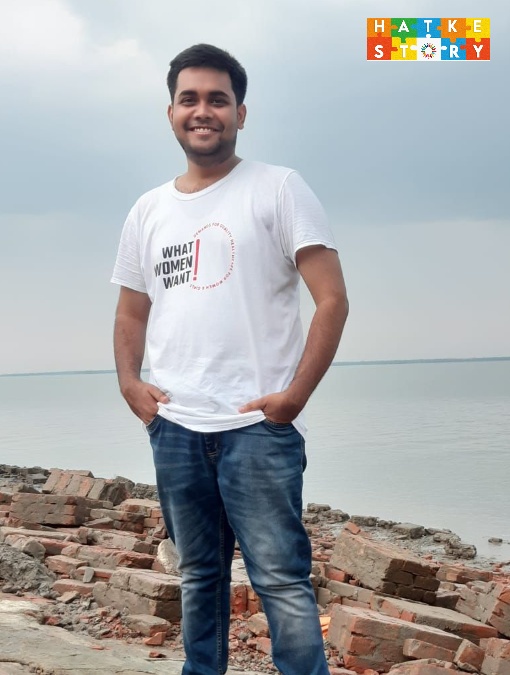
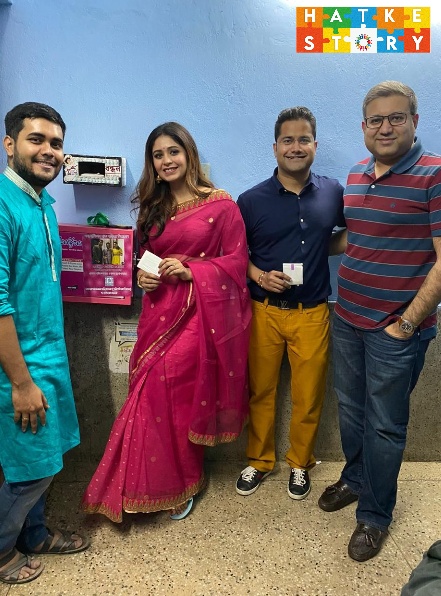
Later, I called my brother and asked him to design an app for me. He is a software engineer, so he helped me out with the Bandhan App. The app works in this area only. If you search for sanitary pads on it, it will show you where these vending machines are installed. So you can find it easily. Now, there are 70 pad vending machines in Kolkata, and we are installing more. Some of them are installed in Delhi as well.
Aashna- Currently, you are covering rural areas. What kind of people are you meeting there? What kind of things are you experiencing there?
Sobhan Mukherjee – In the village area, girls are more open about these topics. Although it takes time to break the ice once they are comfortable, they share enough about it. I teach them how to maintain menstrual hygiene, and during the camp, I carry a kit with me that has all the periods-related stuff like all the types of folding pads, straight pads, menstrual cups, and other related things.
In the camp, I speak to women about their periods and reveal different things. Some of them feel shy to discuss it in public, and a few speak very comfortably. They tell me about their problems, like there is no female gynecologist in their village, and they don’t want to consult a male doctor. We support them in whatever way we can.
I provided a packet of 6 pads only at 16 Rs so that they could afford it. I don’t support free distribution much because we spend on food and other things, so why not use sanitary pads? I believe they will use it as long as I’m distributing it free, and they will stop using it when the offer goes down. So I want them to prioritize menstrual hygiene, and nothing is better than developing a habit.
Aashna- According to your opinion, what are the safety measurements women should take during their periods?
Sobhan Mukherjee – See, menstrual hygiene is a vast subject and cannot be discussed in a few words as multiple diseases are linked to it. But for safety, women must change their sanitary pads within 6 hours. Using a pad for more than 6 hours will cause more harm than good. So it’s a big no!
Avoid using a cloth pad because it is reusable, but it has many layers, and you can only wash the front one. Overall, restrict reusing any cloth or pad. It will give birth to bacterias that might lead you to PCOD or PCOS. You can wear clean cloth. Using a clean cloth is fine, but do not reuse it, not even after washing. Also, don’t take dirty cloth, not at any cost. Use toilets more frequently during periods.
Aashna- The menstrual cup is a new thing in the market, and it is cheap and reusable. Are you not promoting it?
Sobhan Mukherjee – I do promote menstrual cups, and it is safe too, but it has many taboos. Using the cup is very difficult, and virgin girls cannot use it all. It is only for women and has many other things involved. After five years, we can expect more cup consumers, but it is not that famous right now.
Aashna- In recent research, it has been shown that sanitary pad manufacturers use harmful chemicals to make it gel lock, leading to many diseases. These chemicals have cancer-causing bacteria. Is it true?
Sobhan Mukherjee – Changing sanitary pads within 6 hours is a must, and use no odor pads. Companies use more chemicals in those pads that have fragrance. Otherwise, period blood is odorless. Sanitary pads don’t cause cancer but contribute to it. How girls maintain hygiene during periods adds more, anyone can get cancer even if they don’t use sanitary pads. It entirely depends on how girls stay during their periods.
Aashna- How do you help women who are suffering from periods related diseases?
I usually hand over those women to the gynecologist of the area. Otherwise, we organize medical camps in which they treat women who are suffering from these diseases.
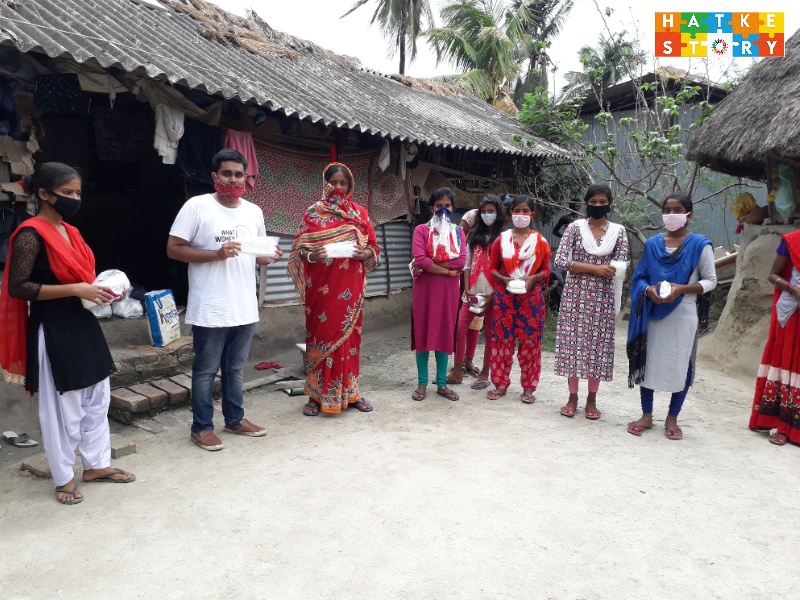
Aashna- In current times, when youth are busy chasing money and a career, you are working in this field. What inspires you to work as a social activist? Do you stay motivated?
Sobhan Mukherjee – See, I stay in this society, so it is my responsibility to think about its welfare. I agree people work for money and they get a lot in return but where do they spend? They spend money on addictions, on their desires, and other unimportant things. In ancient times, people didn’t have a lot of money. Still, they lived happily. Getting food and other necessary things is easy. In short, ‘Mil jata hain khana but help karna is above everything,’ so I believe in helping people, which motivates me to work in this menstrual hygiene area.
Aashna- Sobhan, what is the greatest lesson of your life that you have learned from your experiences till now?
Sobhan Mukherjee – Don’t care about what people tell you. When I set up vending machines in ladies’ toilets, other men would think I’m gay. I have been disrespected many times for working in this area, but I never cared about those remarks. They mean nothing to me. ‘Rude and stupid remarks are nothing but a group of nonsense words that judgemental speak about others. So don’t listen to them and don’t allow them to pull you back.’ It is the greatest lesson of my life.
Connect With Sobhan Mukherjee
Facebook FB Second account E-Mail Bandhan App Link
Like us on FB, if you find our content interesting: https://www.facebook.com/hatkestoryofficial/
Do you have an interesting incident or experience to share with the world? Write to us, and together we can discuss how to weave your story and present it to the world. Would you mind sending us your story?






